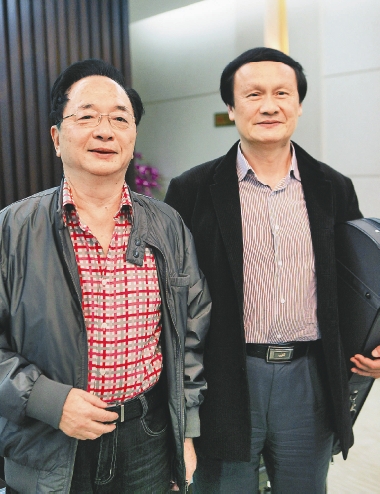
Debra Li
A COMMEMORATIVE concert was held Saturday night at Shenzhen Concert Hall, with Chinese composer Chen Gang serving as host while Pan Yinlin, original violinist of Chen’s works, played tunes that would be familiar to any Chinese who grew up in the 1960s.
Chen, 76, is one of China’s most prominent contemporary composers and known for works such as “Butterfly Lovers,” “The Morning in the Mountain Villages of the Miao People” and “Sunshine on Tashkurgan.”
“This is a historical and emotional reunion,” said Chen. “Evoking memories of some 40 to 50 years ago is, to me, a kind of duty.”
The composer said his first well-known piece “Butterfly Lovers” was the result of “two innocent college students writing a pure piece in an innocent age.” It was written in 1959.
“Times and tides change, but I hope today’s people can appreciate the idealism we had,” he said.
Chen’s music of the 1960s, represented by “Sunshine on Tashkurgan,” is known as “red violin music” because it was written during the Cultural Revolution and was politically inspired.
“In fact, Pan Yinlin urged me to write many of the works,” Chen recalled.
Only model Beijing opera pieces were allowed to be performed at the time. All classical Western music and ancient Chinese pieces were forbidden. Because of the shortage of available music, Chen promised to write violin music for Pan.
“Chinese people had a craving for music. In Shanghai alone, 100,000 violins were sold per year,” Chen said. “Pan’s performances of my music were frequently played on the radio. It inspired many people to learn to play the instrument.”
Pan became such a star in Shanghai that sometimes traffic policemen would recognize him and give him priority. At that time, traffic lights were manually controlled.
Surprisingly, the composer said he had not actually been to Xinjiang or Miao villages before he wrote the much loved works about those places.
“I wrote the music for young people in the 1960s who craved sunshine. The folk songs of ethnic minorities provided me with good material, and I transcribed them for violin, injecting a lot of my own personality.”
To get the right sound of birds chirping in “The Morning in the Mountain Villages of the Miao People,” Chen had a flute-playing neighbor mimic the song of every type of bird for him so that he could choose the best for his music. When the work debuted at a concert in Beijing, it drew real birds to the theater.
Chen and Pan have also performed together in the United States and Germany.
|

